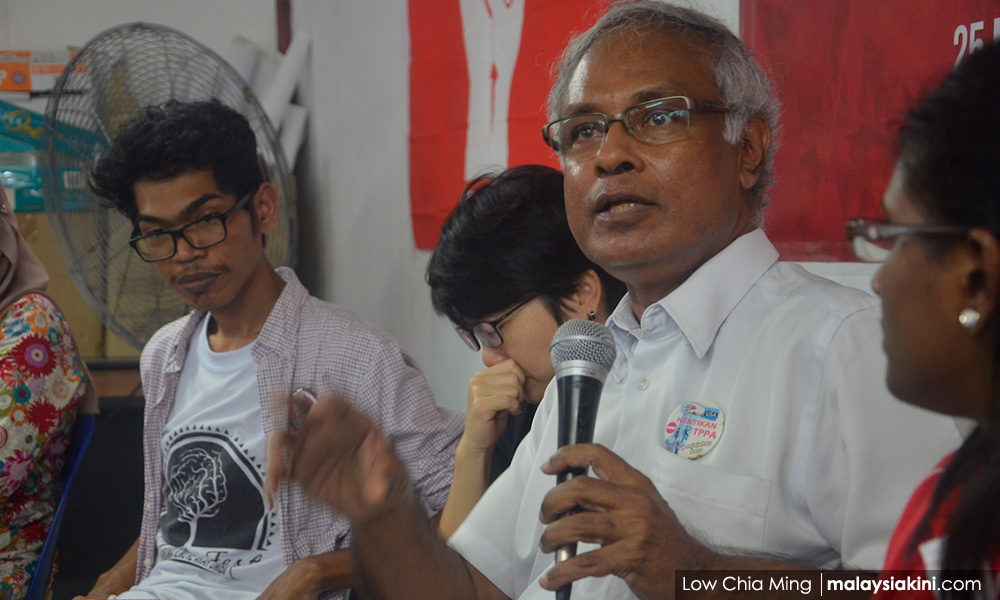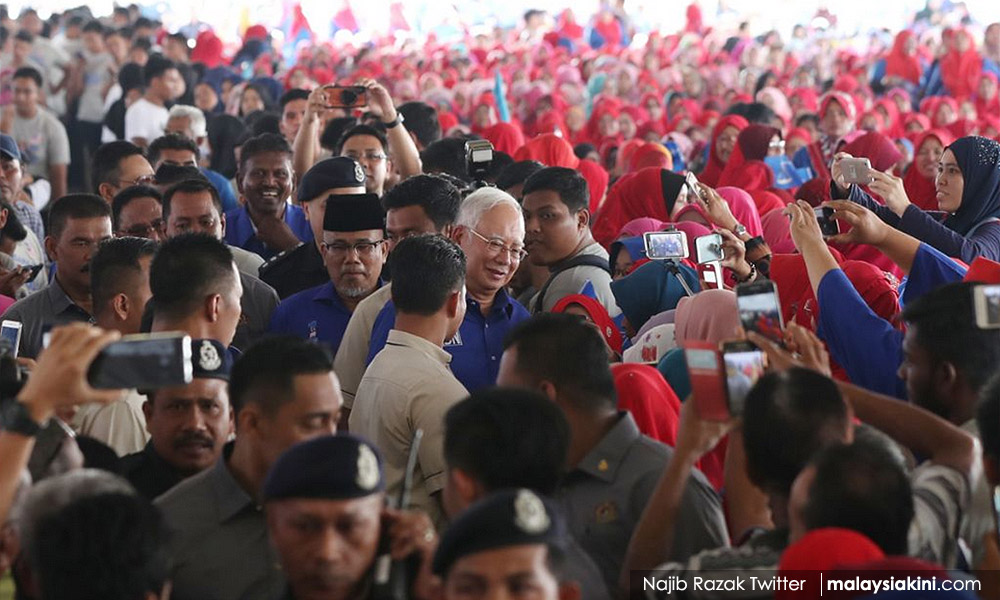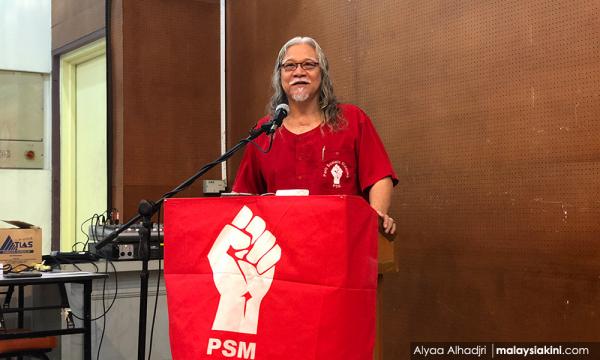COMMENT | Is there much of a choice between a regime that is led by caretaker prime minister Najib Abdul Razak, and another led by Pakatan Harapan chairperson Dr Mahathir Mohamad?
Both have fallen well short of democratic rule for the good of all, in their autocratic ruling style, whether it be of the whole country or of specific states in Malaysia, with neo-liberal economic policies which favour the affluent and the well-connected.
Fortunately, there is an alternative agenda presented by Parti Sosialis Malaysia (PSM) which, though small in size, provides a beacon of hope for Malaysian politics, a beacon that focuses on the big issues and not personalities.
We are told that this general election (GE14) is about BN versus Harapan, and small parties such as PSM should stay out. When the market is cornered by Coca-Cola and Pepsi, there is all the more reason for a healthy drink to replace them in the long run!
This is the reason why PSM leaders such as Dr Michael Jeyakumar Devaraj, Mohd Nasir Hashim, S Arutchelvam, A Sivarajan and others are beacons of hope for Malaysians, in that they are politicians engaged with and working for the peoples’ interests and the big issues facing the country, and who are neither opportunists nor careerists.
Opportunism in its crudest form can be seen when politicians make alliances with corrupt autocrats, and target an individual rather than the regime and political-economic system that oppresses, divides and exploits the people.
Najib has merely made more extreme and extensive the structures created by Mahathir to entrench the powers of the executive, emasculate the democratic institutions and provide the neo-liberal means for private enrichment of the elite in this country. Racist and racial discriminatory policies were entrenched by Mahathir in the early 80s and further amplified by Najib until today.
The politics in the run-up to GE14 have already revealed the bare-faced opportunism in both coalitions as the different factions jostle to place their own candidates in the nomination list. The angry, tearful and desperate press conferences held by leaders of DAP and PKR in recent days provide a precursor of what to expect on nomination day on April 28.
But tragically, what is new about that in Malaysia? Through all this drama, do we hear any discussions about the big issues, about reformasi?
The power wielders in PKR and DAP have already shown that they have no interest in having capable and principled candidates in Parliament, only the loyal members of the incumbent power holders.
In fact, during GE13 they already demonstrated this when, with the exception of Dr Jeyakumar (photo) in Sungai Siput, they did not seem to care if BN won as long as they were able to place their own candidates against PSM candidates such as Arutchelvam and Nasir.

So, their accusation that PSM is a spoiler does not hold water when they have already exhibited their insincerity in past elections.
PSM stands for the people's interests
Mahathir privatised our national assets when he came to power in 1981. Mahathir is indeed the “father of neo-liberalism in Malaysia”, evident throughout his 22 years in power.
On his watch, our national resources were hived off to crony capitalists under the guise of affirmative action. Mahathir thus succeeded in creating private Malay capitalists out of the erstwhile state capitalists who had entrenched their power after May 13, 1969.
Privatisation in Malaysia since the 80s has failed to deliver the purported increase in efficiency, productivity, competition and the elimination of sources of state deficit that heralded its implementation.
The track record of privatisation is dismal, to say the least. The failures of Malaysia Airlines, Proton, KTM and other corporations testify to this fact.
In most cases, privatisation has merely substituted a private monopoly for a public one, often draining even more funds from public coffers in keeping them afloat, without producing any of the benefits that are supposed to come from competition.
Harapan has carried on this privatisation policy in both Selangor and Penang and now that Mahathir is to be their prime minister designate, there has been no indication of any change in his privatisation policy.
It becomes more and more difficult to maintain a public sector to alleviate the living conditions of workers and the poor, when all these public services have been privatised and state land sold to private developers.
Let civil society judge
Concerned members of Malaysian civil society call upon the opposition to avoid creating three-cornered contests in this 14th general election.
We believe PSM is one of the more principled of Malaysian political parties - their leaders are selfless and are grounded in the grassroots.
They are putting up candidates in only 3 percent of the seats and are not demanding any more seats in GE14, because they believe in being firmly rooted in the community before claiming to represent them.
We believe their demand to be the sole opponent of the BN in these few constituencies is reasonable and fair, considering the many seats being contested by Harapan component parties throughout the country. If Harapan thinks their candidates are better than PSM’s, let civil society judge who is the better candidate.
PSM is participating in general elections not so that its candidates can become YBs, but to publicise an alternative programme for Malaysia that is both inclusive and progressive.
Their MP for Sungai Siput since 2008, Dr Jeyakumar, is a model of the representatives we want – knowledgeable, socialist and activist and who was capable of ousting the MIC chief Samy Vellu in 2008. And yet, Harapan leaders are threatening to split the vote there as well.
The "Manifesto of the 99 percent" by The Left Coalition and adopted by PSM is designed to transcend the years of corruption, neo-liberal capitalism and lack of democracy.
Failure to learn the lessons of the last sixty years of BN rule will condemn the country to a further dysfunctional future for the vast majority of Malaysians.

This reform of Malaysian society entails a progressive economic policy for sustainable development including fair wealth redistribution; needs-based not race-based policies; improved public health care system; adherence to rule of law and human rights; zero tolerance for corruption; real participatory democracy through defence of workers’ rights and interests; far-sighted and fair education policy; prioritising Orang Asal rights and livelihood; enlightened social and cultural policies; sustainable development and environmental protection; reallocating defence spending for constructive purposes and promoting a culture of peace.
It is time to build a progressive alliance that aims to create the structures and space in which oppressed people can become empowered through genuine democratic participation in political and also economic institutions.
Real democracy will never be attained merely through periodic general elections and relying on parliament alone: “The movement towards reclaiming participatory democracy, among those marginalised and excluded students, workers, farmers, women and indigenous communities has once again risen all over the world, demanding and taking control of the institutions that shape our lives.” (Naomi Klein)
KUA KIA SOONG is Suaram advisor.
The views expressed here are those of the author/contributor and do not necessarily represent the views of Malaysiakini.


